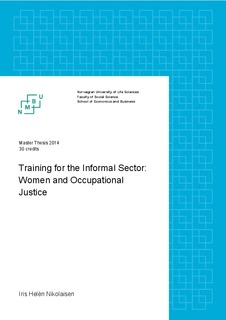| dc.description.abstract | Zambia has exceeded 14 million citizens, and around 6 million represent the work
force. Women make up 48% and the clear majority is found in the informal work
sector. Most women live in poverty and being unemployed is a luxury they cannot
afford. As a result an increasing number partake in risk occupation, such as trafficking
and sex work. In respond to this vast problem international and local organisations
alike, have employed strategies to promote women’s level of knowledge, skill, income
and power.
This dissertation examines the impact of a Zambian vocational training program in
their pursuit of strengthening economic situations for marginalised women. Technical
and Vocational Education and Training play an important role in the pursuit of
securing education for all and improving economic life for the working-age population
of low-income societies. In order to assure the feasibility of these objectives former
participants of one specific program have shared their narratives that form an
explanatory model of present outcomes and impact.
The qualitative study was based on four in-depth interviews with women from
Livingstone, Zambia, They were all former participants of a tailoring skill program
hosted by the organisation reviewed in this dissertation. Together, their stories
produced information on challenges and opportunities that prevail for self-employed
women in the informal work sector.
The main findings indicate that the barriers of forming a viable working life related to
lack of information, deficient skillset, shortage of rescores and poor communication.
In such, there seems to be a disproportion between what the women had expected and
what they gained from the program. Throughout this dissertation, the challenges of
setting up a sustainable self-employment in the informal sector will be reviewed and
compared to principles within the framework of occupational justice. | nb_NO |
